Article's Content
Calm is valued at more than $2 billion. The leading meditation app boasts:
- 120 million downloads
- More than 8.1 million backlinks
- Over 207,200 organic visits a month
- More than $23 million in in-app purchase revenue in 2021
It’s no wonder Calm has attracted sterling 5-star reviews from over 1.5 million users.
We took a closer look at Calm’s marketing engine and found that it’s earned the trust and money of over 4 million customers through three major areas of focus: branding, content, and YouTube SEO.
This case study is a deep dive into Calm’s marketing engine. We’ll explore the strategies Calm used to dominate the meditation industry, including how it uses content and YouTube SEO to drive growth.
Ready? Let’s go. 🚀
“I read every issue of the Foundation newsletter. The breakdowns are outstanding.”
– Brian Dean, Founder of Backlinko (acquired by SEMRush)
How Calm Grew To Dominate The Meditation Industry
Here’s a fact about Calm that you might not know…
One of Calm’s co-founders, Alex Tew, is the brains behind the internet sensation: The Million Dollar Homepage.

This project’s success set Alex up to launch more internet projects—including Calm, which is the most successful. Calm started in 2011 as a website called donothingfor2minutes.com:
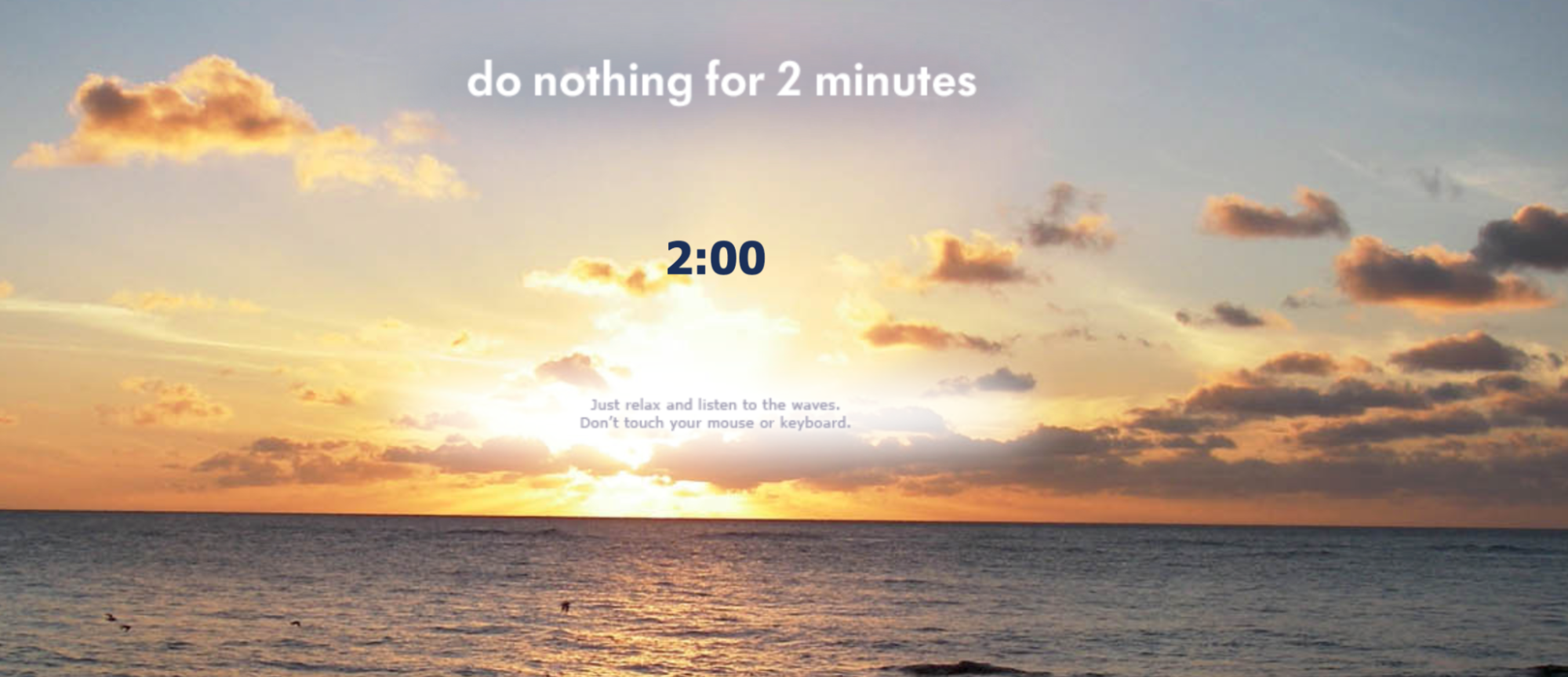
The idea was to get people to pause, stare at the screen, listen to the sound of the waves, and relax for two minutes. All without touching their mouse. At the end of the two minutes, a prompt asked users to like the Facebook page and sign up.
In just two weeks, the Facebook page had over 300,000 likes and the site had 100,000 sign-ups.
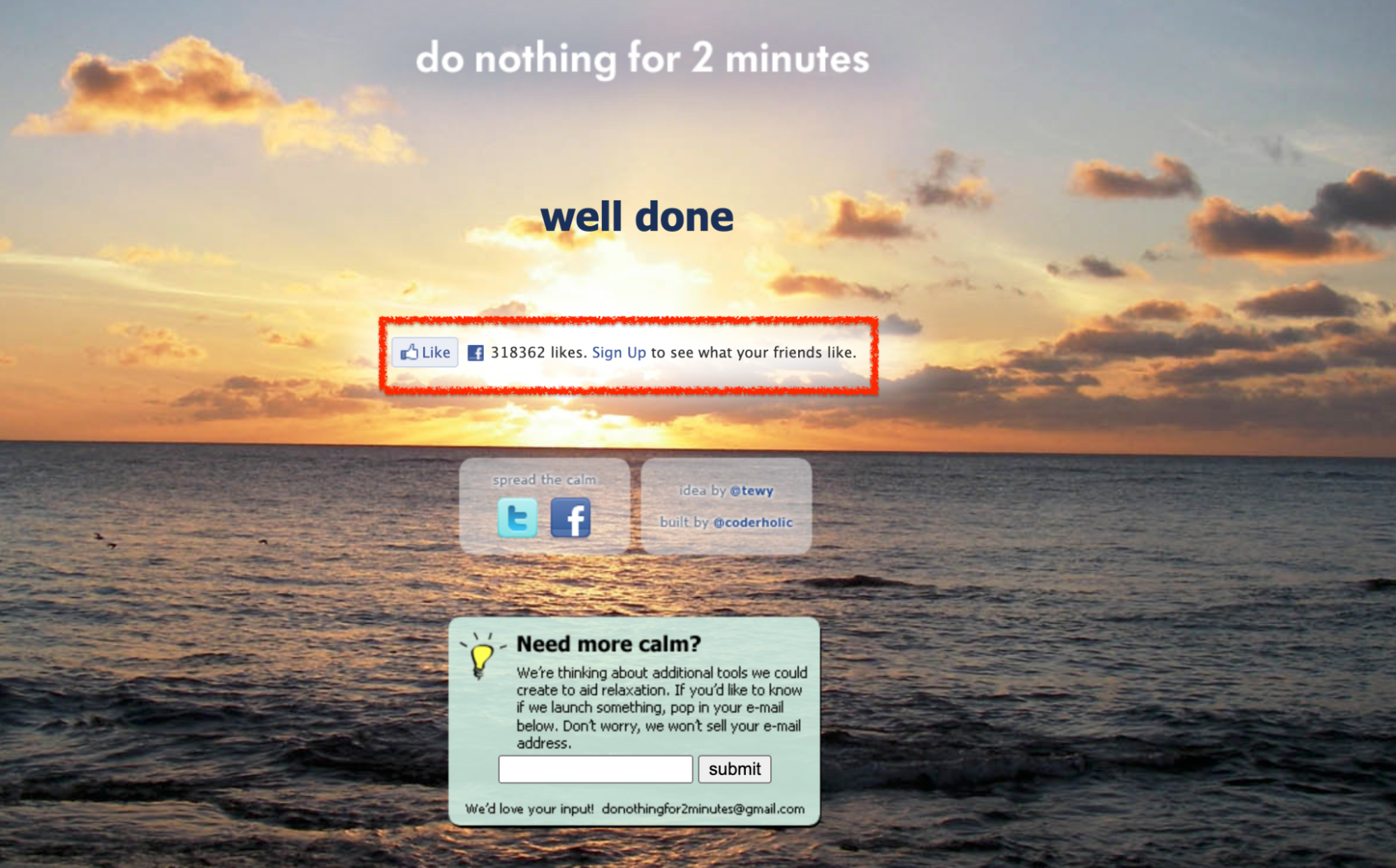
Leveraging the website’s success, Alex Tew and Michael Acton Smith co-founded Calm.
Headspace, a competitor that was founded two years before Calm, was already making waves in the UK and Silicon Valley. Calm had a tough time competing because it was understaffed and underfunded. It wasn’t until 2017 that Calm started to see some real success:
- Won Apple’s App of the Year award in 2017
- Named #1 meditation app in 2019, outshining Headspace
So even though Headspace already dominated the market, Calm overtook Headspace in revenue five years after launch, despite its small team.
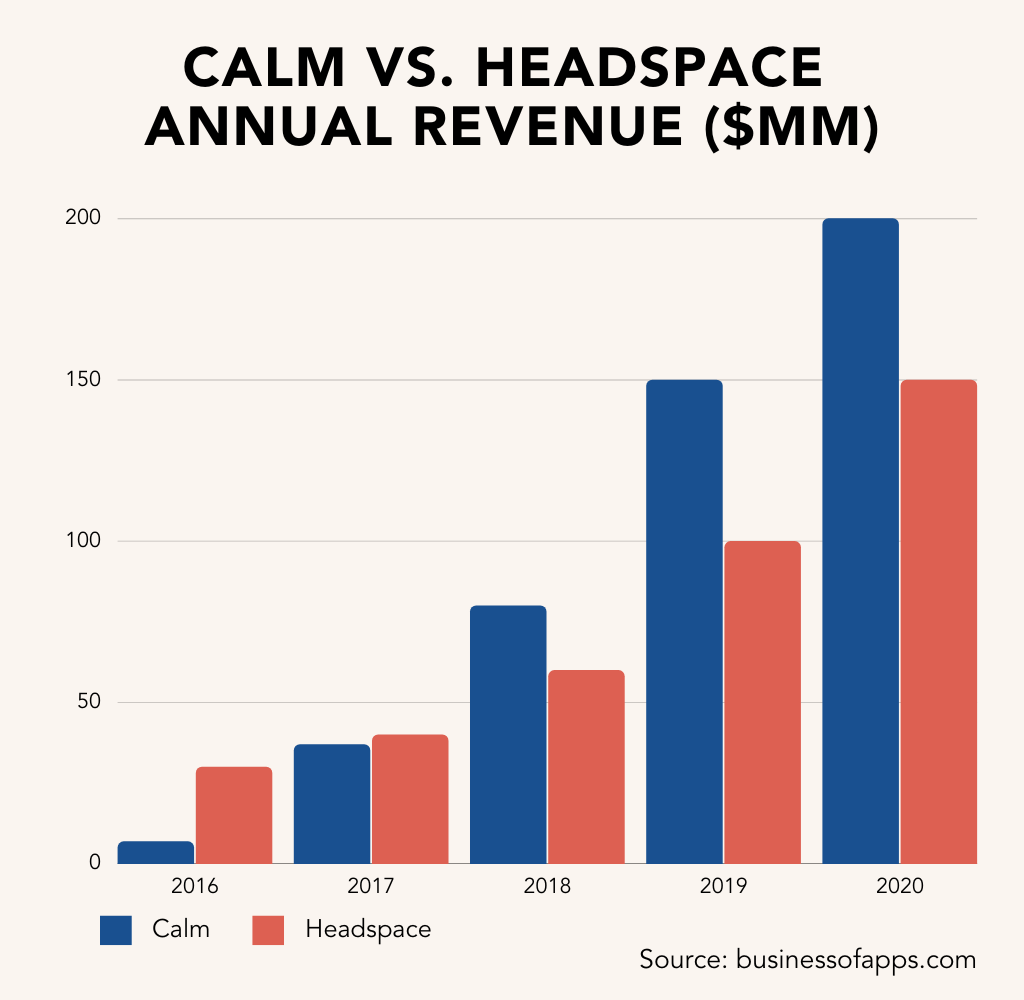
Content played a major role in winning users and investors over.
Cofounder Michael Acton Smith said they increased premium content prices to increase revenue and attract potential investors. It worked: Calm raised $218 million in funding. That’s the power of content—its ability to turn readers into paying customers.
Let’s review Calm’s strategy for creating content that converts.
How Calm Uses Content To Drive Traffic & Backlinks
First, let’s take a look at these numbers:
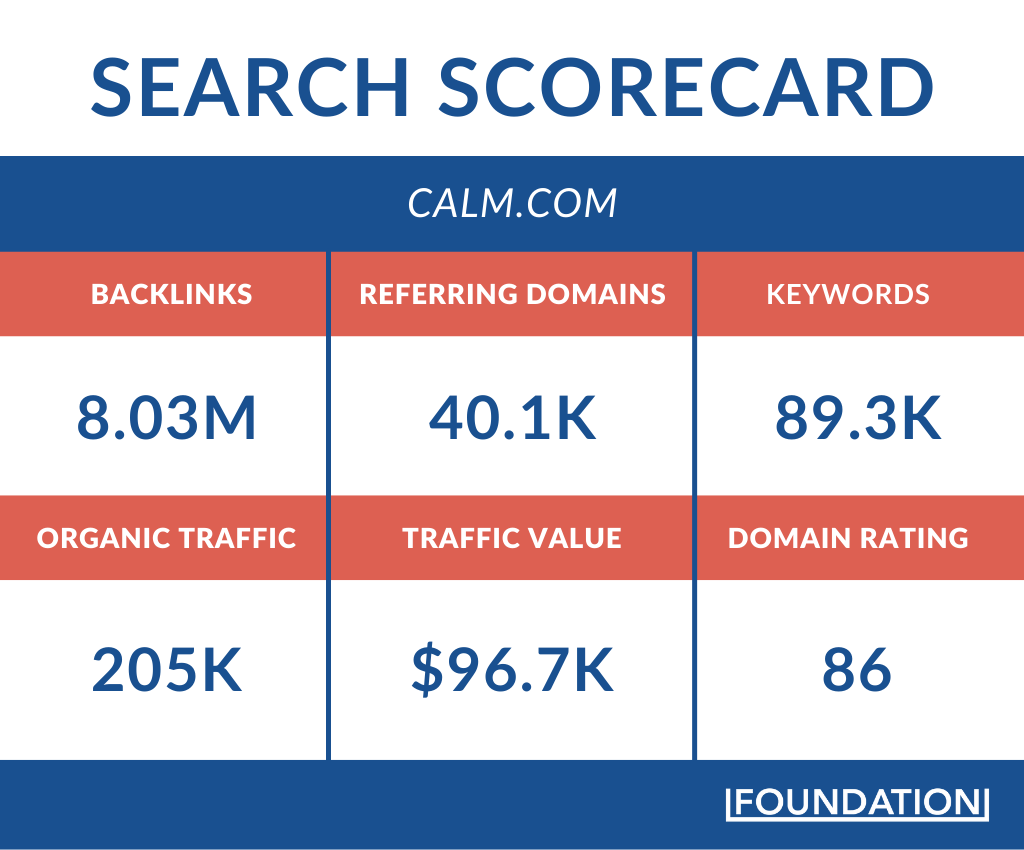
Calm’s meditation tool and rich content have attracted over 8 million backlinks. Creating assets that attract backlinks from high-authority websites is an SEO tactic that drives visibility and generates organic traffic.
We found that Calm’s free tools were the most highly linkable assets, followed by definitions, stats, and research. These assets win prospects over and boost organic ranking on search engines.
For example, Calm dominates the SERP for the keyword “feelings wheel,” which has over 52,000 monthly searches. This high search volume attracts over 21,000 monthly visitors to Calm’s blog post.
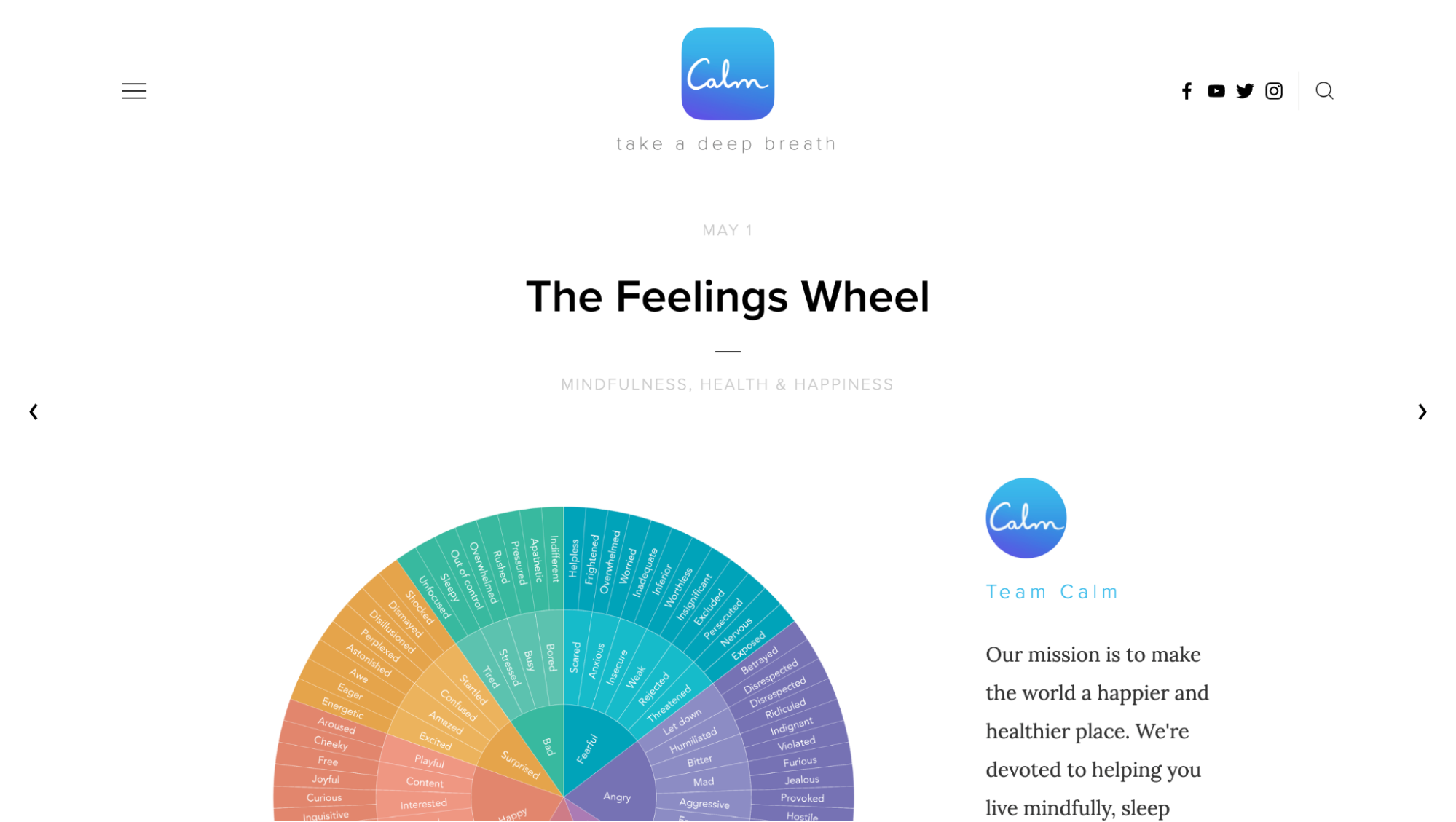
The blog post has also generated over 400 backlinks from high-authority websites like Indeed and MSN. The piece directly targets Calm’s audience—people who are stressed out and looking for ways to relax.
Headlines are another way Calm captures prospects’ attention in the SERPs. Take this blog post, for example:
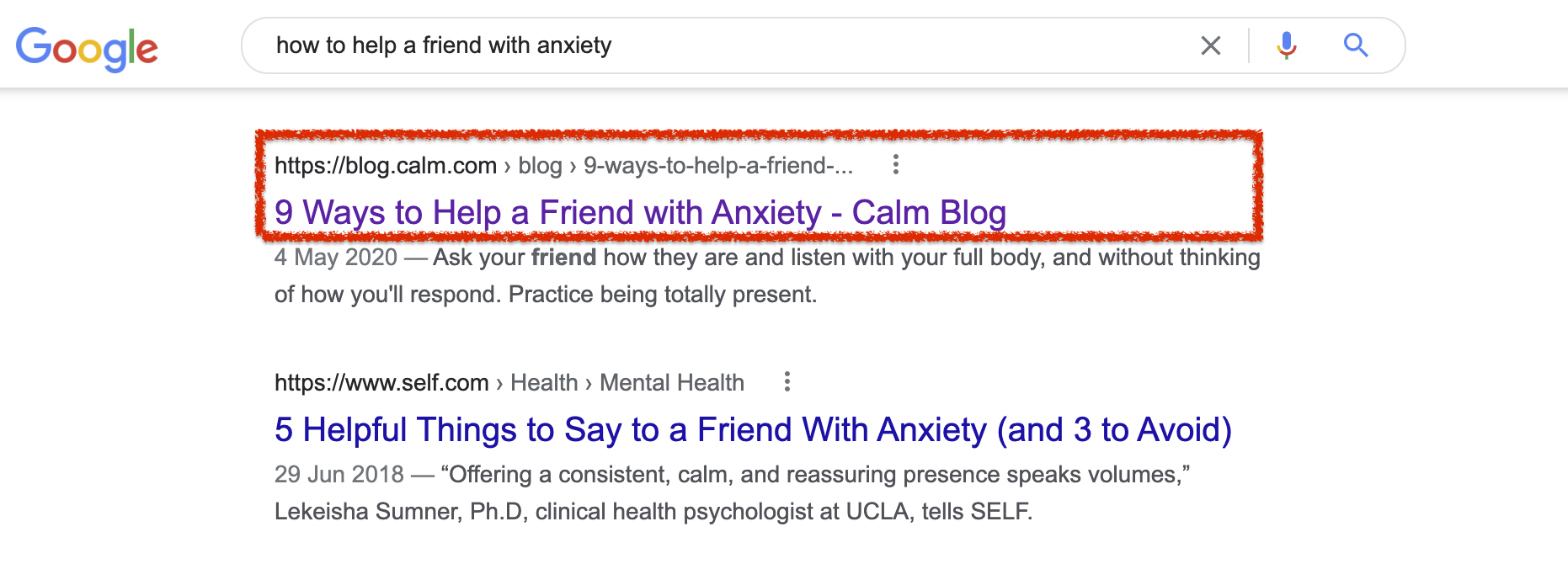
Calm captures attention by using “9” to tell readers there are different ways to solve the problem and includes the keyword “help a friend with anxiety,” which has 600 monthly searches. As a result, the headline attracts over 1,000 visits each month.
To create content that attracts and engages readers, then turns them into customers, do these:
- Know your audience
- Craft attention-grabbing headlines
- Leverage the power of emotion
- Use short paragraphs instead of large chunks of text
- Use a font style and size that the average person can read clearly
- Include visuals to break up text and explain your points
- Add value before selling
- Include testimonials and case studies
- Choose a strong call-to-action
Calm also leveraged influencer collaboration to boost its credibility and authority in the space. Let’s see how they do it.
“If you do not subscribe to Foundation’s newsletter, you are missing out on a content marketing GOLDMINE. Definite must-read.”
– Rachael Hensley, Director of PR and Comms at Shippo
How Calm Uses YouTube SEO to Increase Organic Reach
YouTube is the world’s second-largest search engine, with over 5 billion videos viewed daily. The platform generates 3 billion monthly searches, presenting B2B and B2C brands an opportunity to provide relevant content for searchers.
YouTube SEO is a fascinating, underrated tactic. Brands like MasterClass and Salesforce leverage YouTube to increase their organic reach and educate prospects. Calm is not left out of the mix.
Like Masterclass, Calm relies more on YouTube than Google as a search engine. It’s no wonder YouTube generates over 50% of Calm’s organic social traffic:
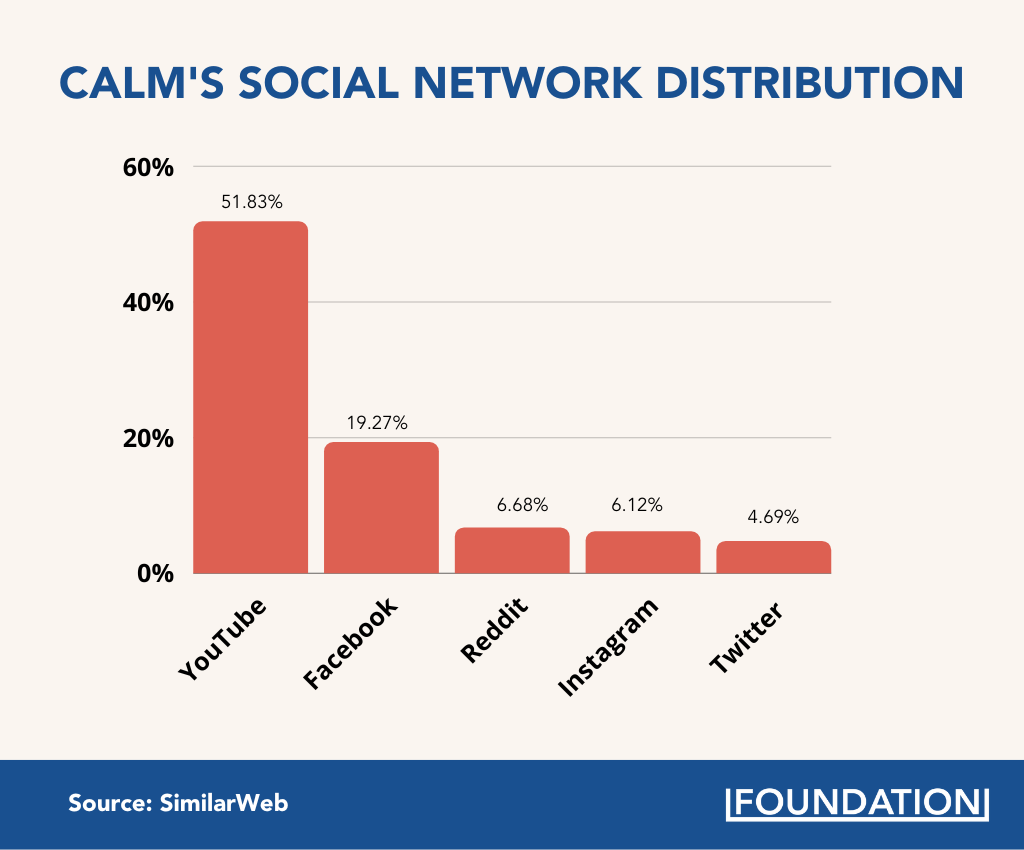
The Calm team optimized YouTube content by leveraging a combination of high-intent niche keywords to boost ranking and visibility on YouTube’s results page. The results are staggering:
- More than 111,232,904 views on Calm’s videos
- 713,000 subscribers who rely on the channel to reduce stress and sleep better
What made Calm prioritize YouTube SEO over traditional search?
Well, for starters, it was an insight the team uncovered. They noticed that most Calm users were active between 9 PM and 11 PM. Anyone using the app at that time probably isn’t trying out a meditation exercise to start their day. Most are likely trying to relax their minds and get some sleep. Since YouTube is the largest search engine after Google, it’s only logical that Calm invested in creating YouTube videos around high-intent keywords like those that people search when they can’t sleep.
For example, the keyword “mindfulness meditation” has over 28,000 monthly searches. When you do a quick search on YouTube for this term, you’ll see three of Calm’s videos dominating the results page in quick succession:
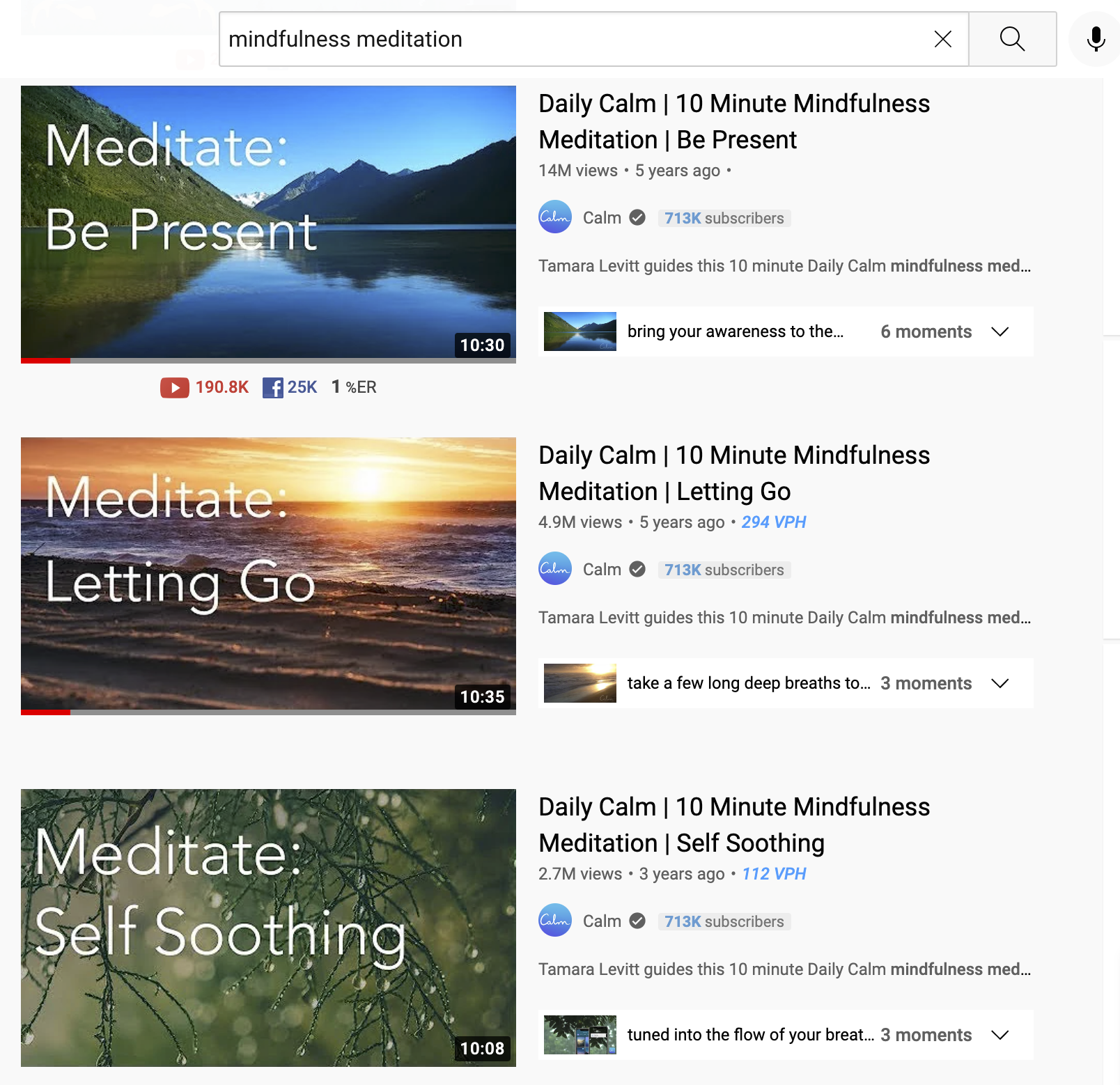
Notice how each of these videos has over a million views. This is directly related to the power that YouTube videos have in the SERP:
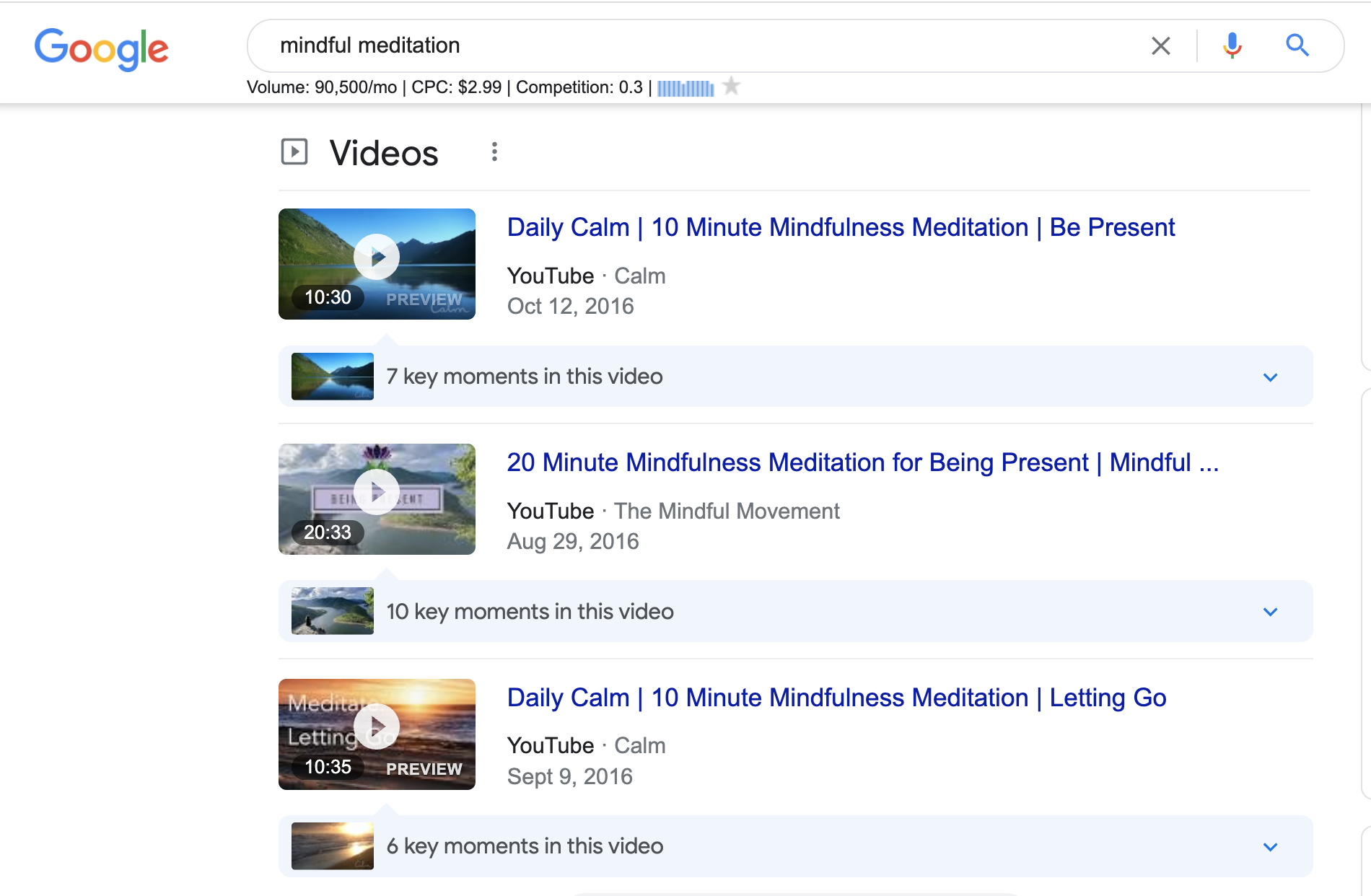
Each month, there are more than 90,500 searches for mindful meditation. Calm created two of the three videos that appear at the top of the ‘videos’ section in the SERP. The Be Present video has an impressive 14 million views. Even though most of these videos are up to three years old, they still generate hundreds of views per hour. Talk about treating content as an investment.
Calm also has video categories optimized for different audiences, including:
- Calm Kids
- Calm Stories
- Soothing sounds
- Take a deep breath
- Calm Sleep Stories
- Daily Calm | 10-Minute Meditations
- Meditation for Beginners with Tamara Levitt
Some videos in these categories have earned as many as 20 million views.
The most popular YouTube video on Calm’s channel is an 8-hour video, “Rainstorm Sounds for Relaxing, Focus or Deep Sleep | Nature White Noise.” People have viewed this video 24 million times, with an average of 14,000 daily views.
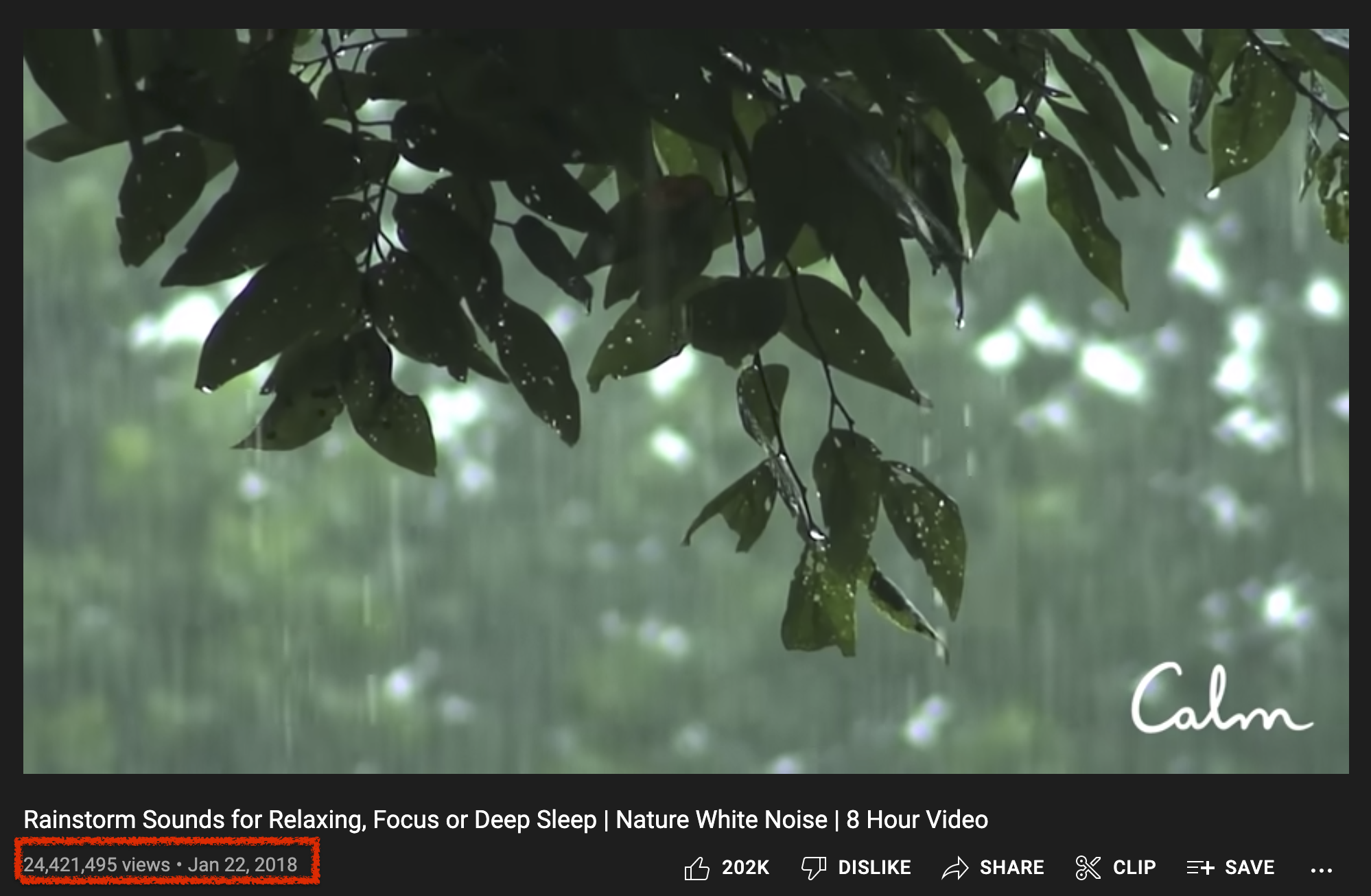
The conversion work on each of Calm’s videos is brilliant. The rainstorm sounds video features Calm’s logo design prominently throughout the entire video, and the YouTube description is optimized to immediately drive people to sign up for the app.
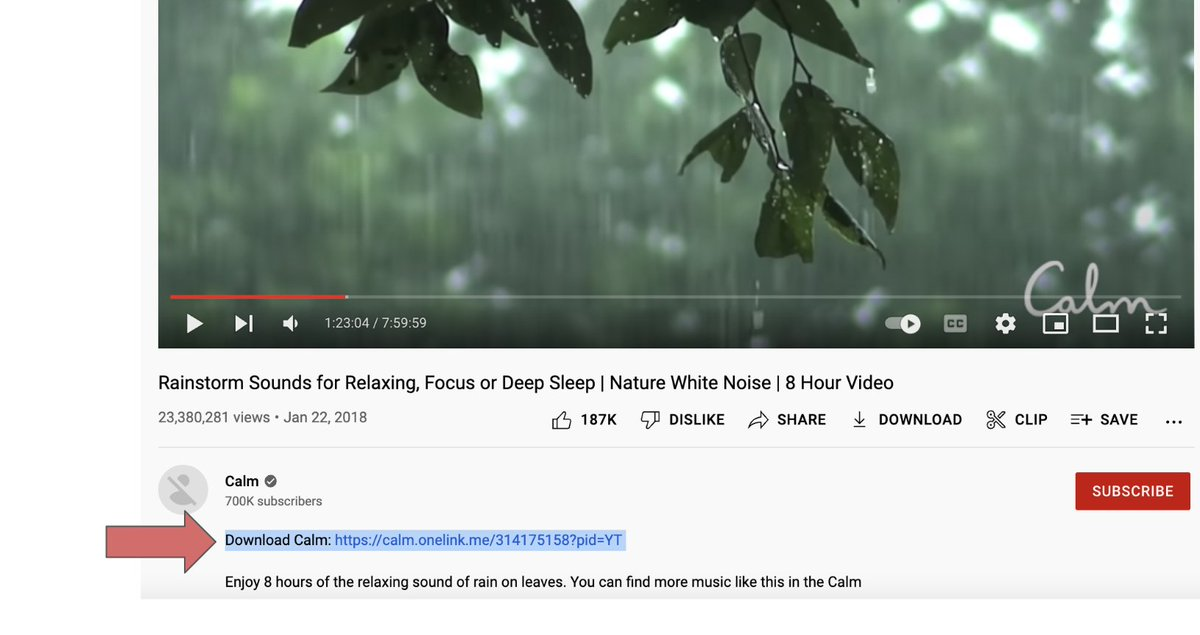
Calm repeats this across other videos in its library.
The comments sections of Calm’s YouTube videos are also filled with people being nice to each other. One commenter wrote: “This is the only rain sound I’ve found without loud lightning and tinder noises. It really helps me sleep at night.” When you scroll down the comment sections, you’ll see tons of people sharing how much Calm sleep stories and video library has helped them find peace and sleep better.
Calm’s Media Strategy: Leveraging Celebrity Influence
Since 2015, it’s estimated that there are more than 2,500 different meditation apps in the App Store. That’s a lot of competition for Calm. But Calm stands out by thinking outside the box and investing heavily in brand differentiation.
For example, when the founder of Calm described their vision for the product early on, it was described as “Nike for the mind.”
Nike is known for collaborating with top athletes and creating emotionally driven content. Now, Calm is doing the same—partnering with celebrities to gain user trust and boost conversions. Some celebrities Calm collaborates with include:
- Lebron James
- Harry Styles
- Mandy Moore
- Stephen Fry
- Michael Buble
- Deadmau5
This gives the app mass market adoption and establishes credibility. This is what Calm looks like today:
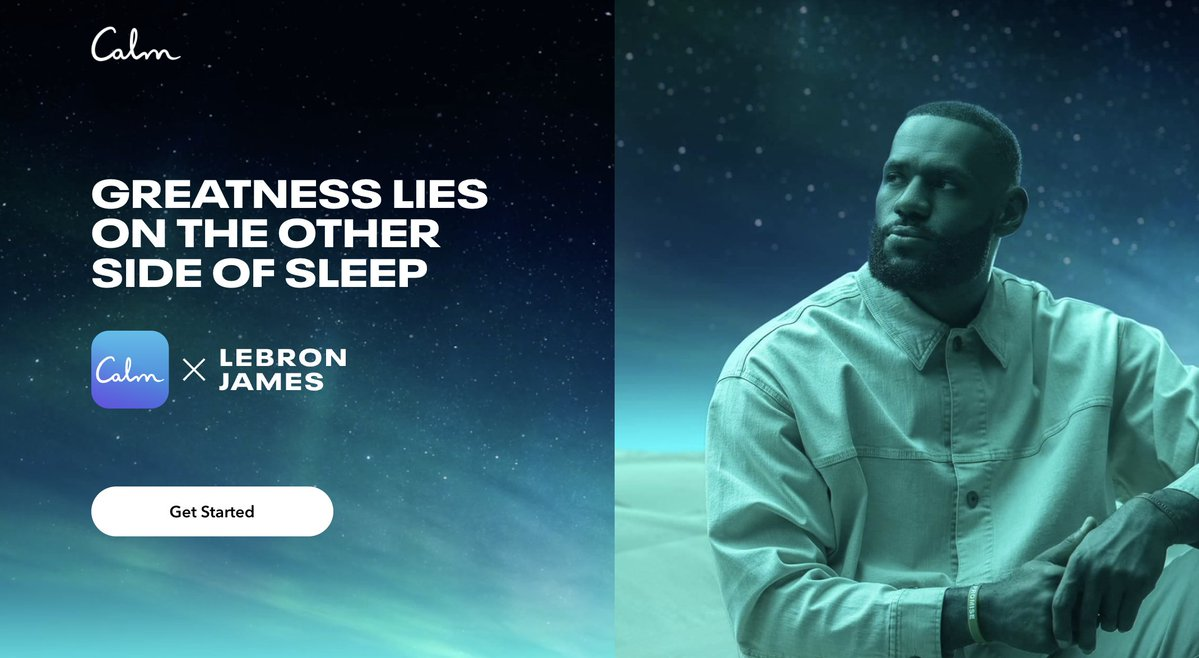
Calm is quickly evolving from a meditation app into a mindfulness & wellness media company. Calm isn’t just for meditating anymore. It’s now filled with mindfulness & sleep content:
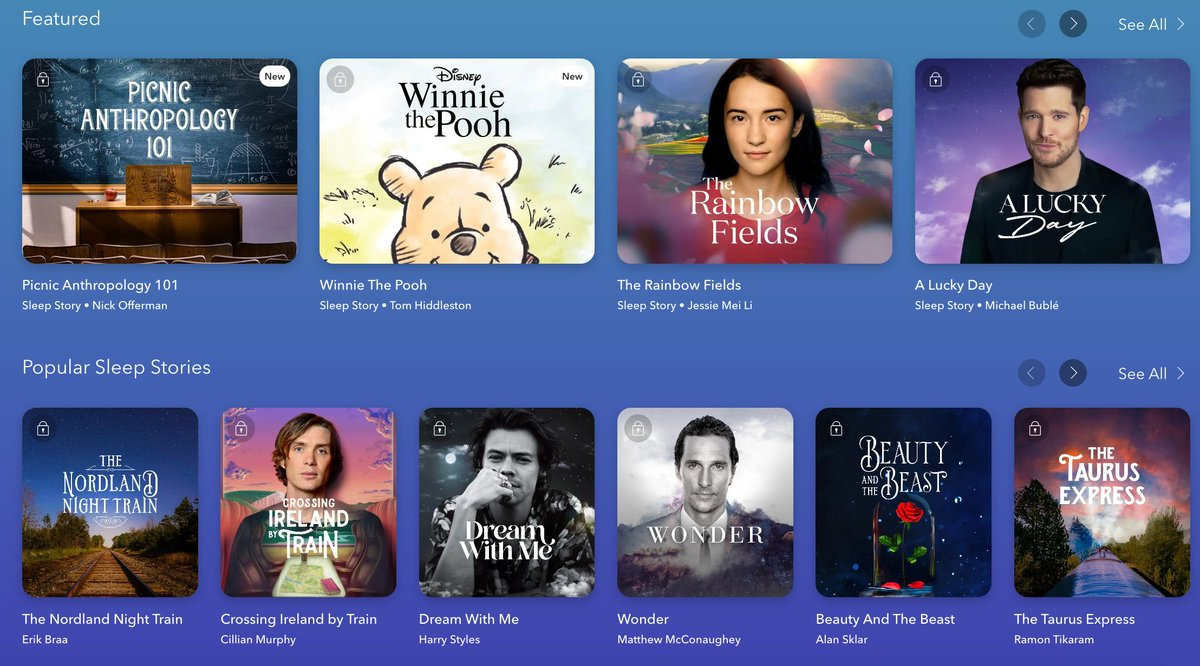
The most genius part of Calm’s partnerships is getting the celebrities to develop content. For example, in the series with LeBron James, he preps users before the big game by sharing his mental frameworks and strategies for getting into the zone.
Calm has also leveraged celebrity influence through its Sleep Stories.

Celebrities like Stephen Fry, Matthew McConaughey, LeBron James, Leona Lewis, and others share original or fiction stories to help listeners sleep better. This one of Stephen Fry reading a story has generated almost 15 million views so far:
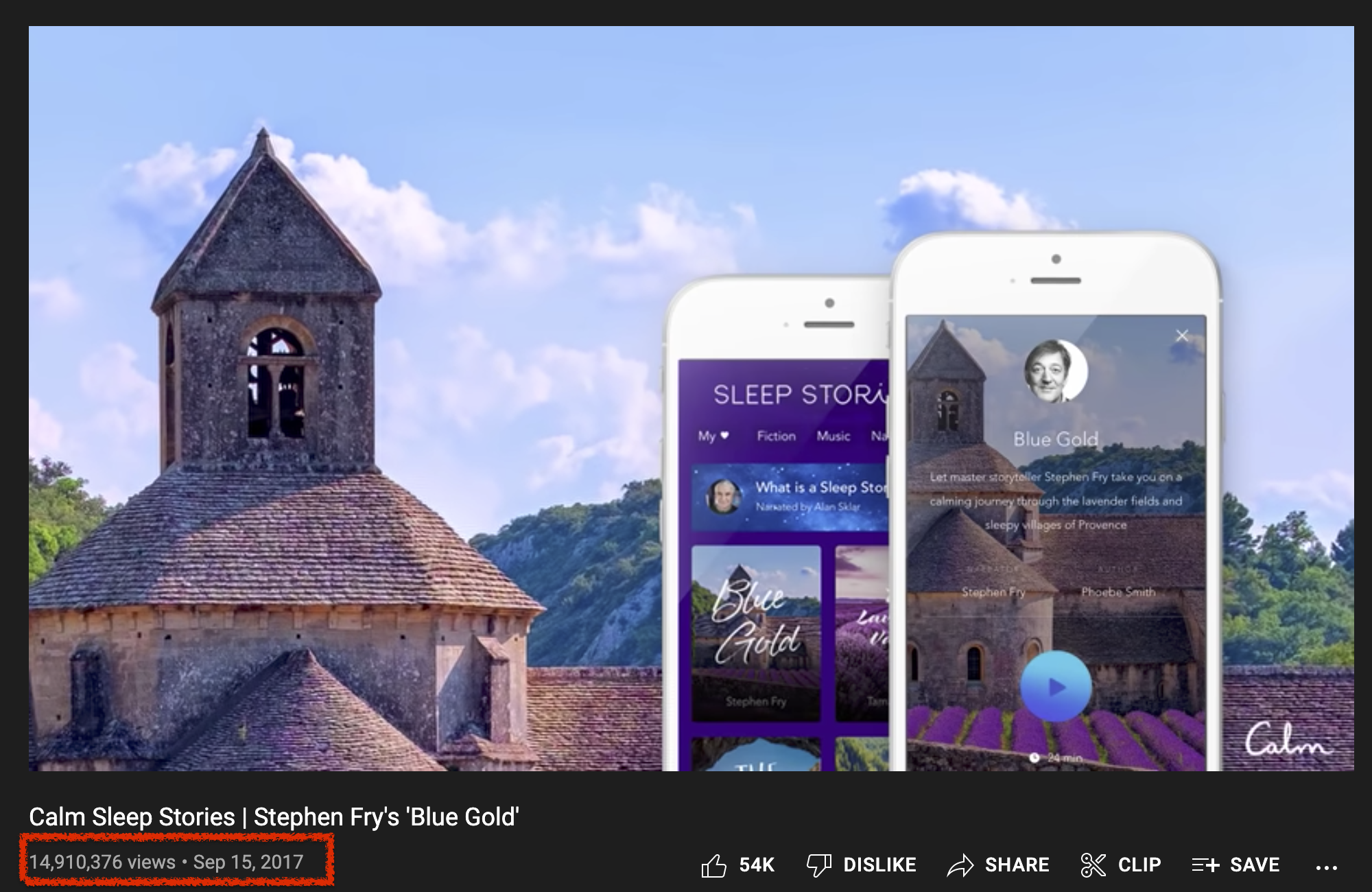
Mathew McConaughey’s sleep story, “Wonder,” has reportedly been streamed over 11 million times.
Celebrity power boosts Calm’s authority, credibility, and awareness. For example, if LeBron James tweets about his sleep story with his audience, his massive following will rush over to listen and sleep to the sound of his voice.
The secret sauce is leveraging celebrities whose influence boosts Calm’s brand awareness and makes its website more linkable. Some of Calm’s pages with the most backlinks are from celebrity partnerships.
While we admire Calm’s strategy, we aren’t asking you to invest millions of dollars in celebrity partnerships. Instead, you can partner with experts in your niche. Here’s how to do it:
First, draw up a list of experts and put them on a table like this:
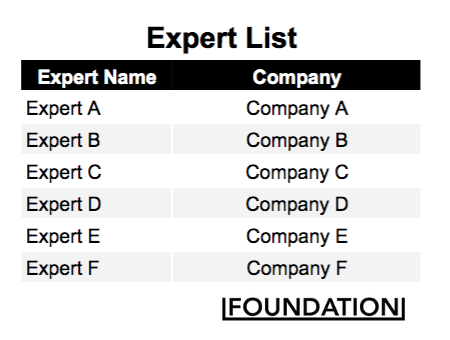
Then rank them according to follower count, authority, or any metric that impacts your bottom line.
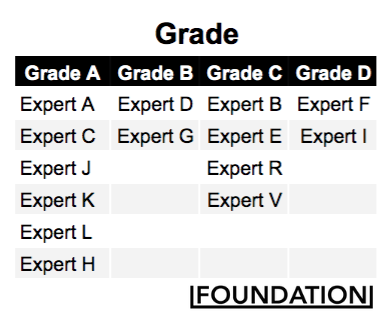
Finally, determine the connection between you to these experts:
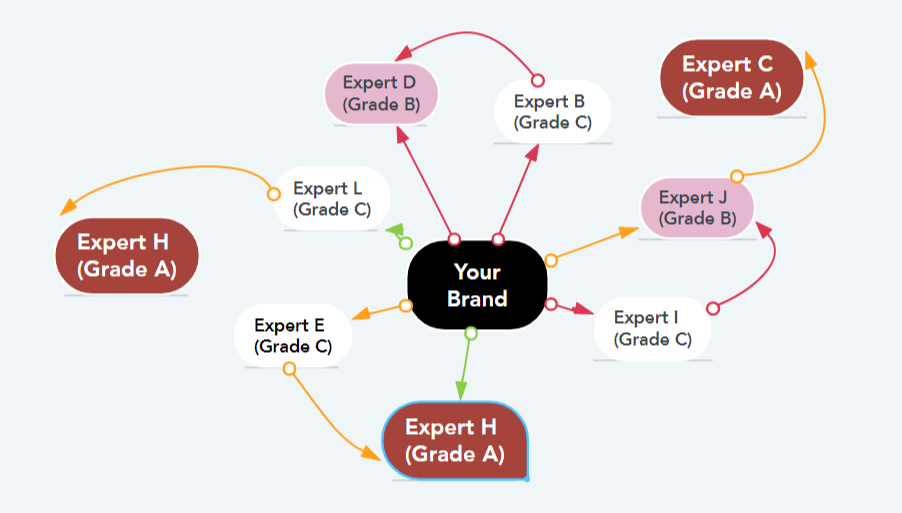
That means if you already have a relationship with some of the experts on the list, you can reach out to them faster than those you don’t know personally. However, an expert you know might know another expert on the list. You can leverage that connection to reach those you don’t have relationships with yet.
When you complete this step, you can craft your pitch and reach out to them for a mutually beneficial partnership.
What Calm Can Do Better
Calm has done a great job evolving from a meditation app to a wellness and mindfulness media company. The team has even created Calm Business to serve other businesses.
A brilliant move for Calm would be to take a page out of Masterclass’s SEO book and build content that goes above and beyond YouTube. That means:
- Creating more original linkable blog assets
- Publishing informational blog posts on wellness and mindfulness topics
- Leveraging more webinars to generate awareness
- Repurposing content for social media platforms
- Leveraging reactive storytelling and intent-based marketing
Doing these has the potential to 10x Calm’s current results and drive business growth long-term.
“A newsletter that I read every single time when it hits my inbox! It’s full of deep analysis for B2B marketers, with hands-on case studies of how the most successful SaaS companies and marketplaces conquered their SEO niche.”
– Lars Kamp, CEO, Some Engineering Inc.
Quick, do it now before the next drop!







